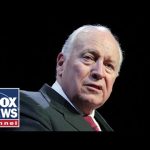Richard B. Cheney’s passing on November 3, 2025, marks the end of the life of a titan of American conservatism and national defense. He died at 84 from complications related to pneumonia and cardiac and vascular disease, surrounded by family who praised his devotion to country and kin. For millions of patriots, that alone is worthy of solemn thanks and a quiet moment of respect.
Cheney’s record reads like a blueprint of Republican governance in the late 20th and early 21st centuries: House member, White House chief of staff, Secretary of Defense and then the most consequential vice president in modern memory under President George W. Bush. His steady hand after 9/11 reshaped American policy at the highest levels and his influence helped steer the war on terror at a time when timidity would have been catastrophic. Love him or loathe him, no serious student of history can deny the scale of his imprint on national security.
If you tune into Newsmax’s coverage, chief correspondent James Rosen laid out Cheney’s complex legacy with the seriousness it deserves, refusing the caricatures favored by the left and by opportunistic cable hosts. Conservatives understand that leadership in crisis is messy, and Rosen’s reporting reminded viewers that Cheney’s decisions flowed from a consistent philosophy: protect the American people at all costs. For those who understand service and sacrifice, that resolve felt like old-fashioned patriotism in a world that sorely needs it.
Yes, Cheney was controversial—he pushed hard for Iraq, backed expanded executive authority, and presided over policies that became political targets for decades. The debates over intelligence, interrogation, and government power will continue in classrooms and courtrooms for years, and rightly so; a free country must interrogate even its defenders. But conservatives should also remember context: a government that hesitates when danger is real leaves Americans exposed, and Cheney’s critics rarely grapple with that grim alternative.
His personal story was marked by courage and endurance: decades of service, public scars from heart disease, a 2012 heart transplant and a family that stayed close through the storms of public life. He raised children who would not shrink from politics—most notably Liz Cheney, whose vocal stands remind us that principle can mean taking heat from all sides. Whether you agreed with his politics, you could not question his commitment to what he believed would keep our nation safe.
Hardworking Americans ought to honor Dick Cheney not with blind worship but with clear-eyed gratitude. He lived by the old maxim that government’s first duty is to defend the nation, and he acted on it when it mattered. As the chattering classes spin and the left relishes the moment, millions of patriots will remember a leader who put country over comfort, and who taught his children and grandchildren to love America the way those who have carried her burden must.




